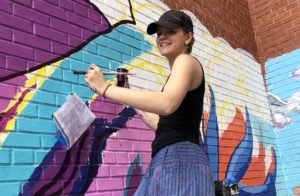
Chandler Simpson ’21 is proudly assuming her family’s Tar Heel tradition. While the Simpson name has been carried through The University of North Carolina at Chapel Hill for five generations, Chandler Simpson has certainly made her mark on Carolina.
A rising junior, Simpson is an advertising and cultural studies double major with a visual culture and consumer culture focus. Through the various opportunities provided by the UNC School of Media and Journalism and the Morehead-Cain scholarship program, Simpson has already made an impact on the Carolina community and beyond.
This past summer, Simpson had the opportunity to use her artistic abilities as an intern for Thrive Collective in New York City. “I went as a public relations intern,” she said. “When I got there, they immediately asked me, ‘Do you paint?’ Suddenly, I was doing it all.”
Simpson helped design and paint 14 murals at various NYC public schools, taught art to students and co-organized an anti-gun violence festival for students in Queens. She also interviewed and photographed artists, students and community members for a social media campaign centered on the way art impacts lives.

“The Thrive Collective artists and I designed this mural with the students at MS 42Q in Far Rockaway, Queens, for their art class. Then we all worked to execute it.”
The Big Apple experience reignited Simpson’s passion for using art as an educational tool. She’d already become involved in Workroom: FashionMash, a collection of classes led by Dana McMahan of the UNC School of Media and Journalism. The program provides students with a deep, creative immersion in the fashion industry and bolsters portfolio work. Simpson fell in love with FashionMash and has applied her talents in the classes to develop media, art and sustainability initiatives.

“I had the opportunity to design and create the Gucci Web space in UNC FashionMash’s Gucci Good exhibition, created by our “MEJO 650: Workshop FashionMash Experiential Design” class. The installation is about how Gucci in my view is caught in a “web,” between its heritage as an Italian leather brand and its current place as an innovative, forward-thinking fashion house.”
As a result of her Carolina classes on fashion, design and cultural studies, Simpson is fascinated with learning as much as she can about the place where fashion and sustainability intersect. She has taken it upon herself to spread this knowledge across campus as the co-founder and creative director of Carolina’s Sustainable Fashion Initiative (SFI). “Our goal for SFI is to educate students and community members about sustainable fashion by putting conscious consumerism into action through repurposing workshops, clothing swaps, vintage photoshoots and advocacy campaigns,” Simpson said.
Simpson recognized that in order to properly educate others about this topic, she would need to expand her knowledge. In spring 2019, she collaborated with friends from the MJ-school and the Morehead-Cain program to work on a research project that took them to India over spring break.
“We flew to Delhi and met with representatives from organizations that are trying to bridge the fashion industry and environmental concerns. All of us on the trip were so inspired by the people we met. They were working so hard to make major changes. I came away thinking that I, too, could initiate change.”

“We visited Nahargarh Fort in Jaipur during our 2019 spring break trip to India.”
These experiences, promoted by her professors at the school and financially backed by her Morehead-Cain scholarship, have significantly shaped Simpson’s Carolina story, as will this summer’s internship at the London office of Jack Morton Worldwide. The global PR firm’s Chair Emeritus Bill Morton ‘62 graduated from the MJ-school. Simpson will complete her studies in Chapel Hill and move into the workplace with a portfolio full of design experiences and as an advocate for mindful consumerism.
Related Stories







